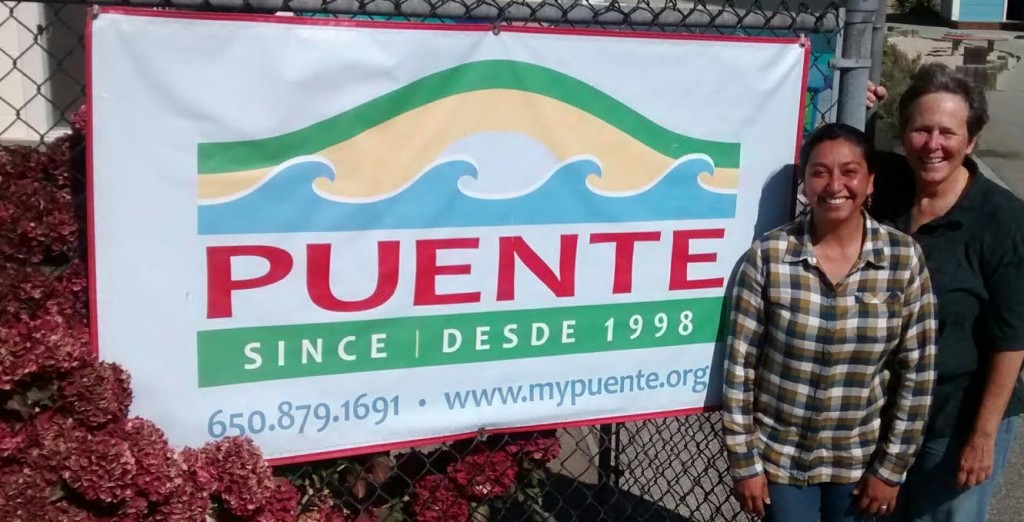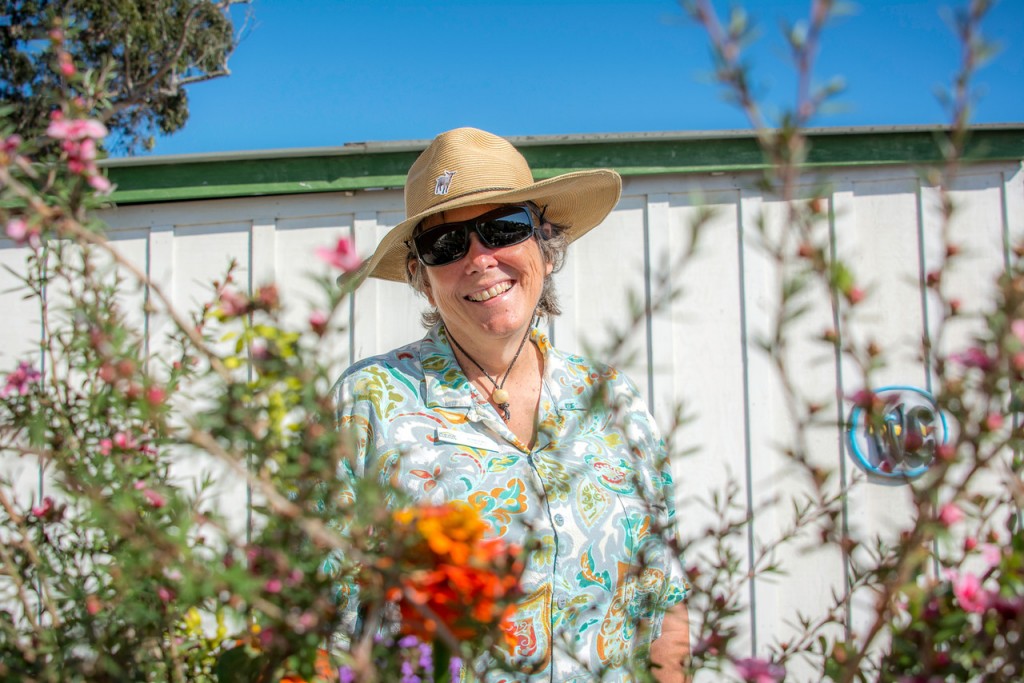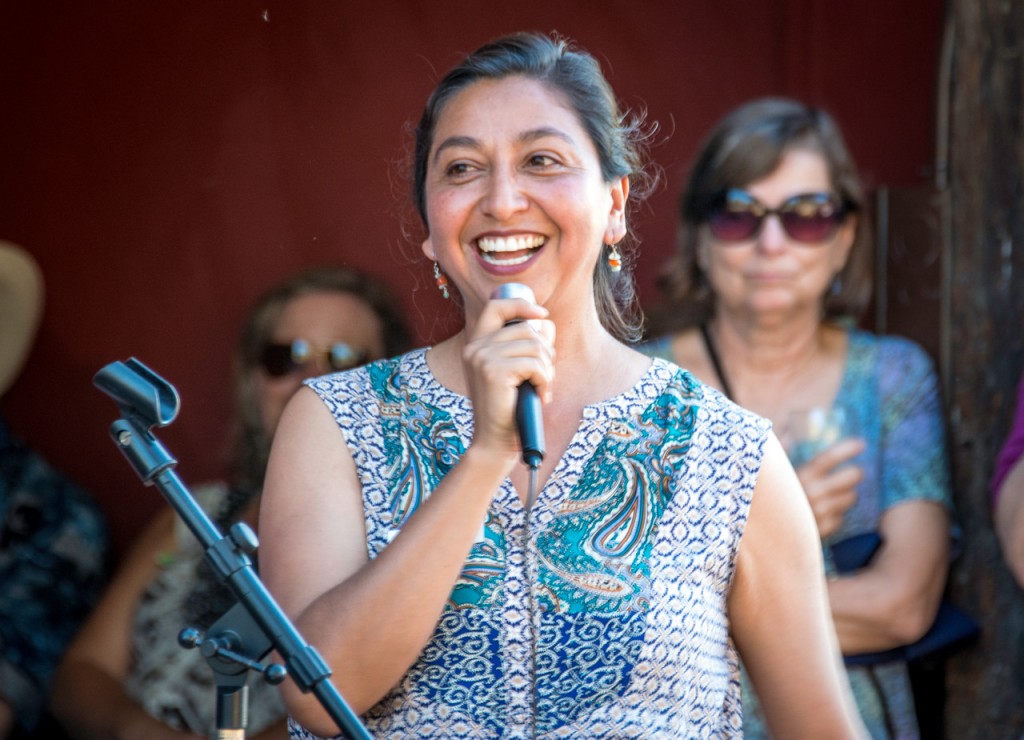In Central and South Mexico, Dia de los Muertos (Day of the Dead) is a hallowed melding of Indigenous and Catholic traditions that honors loved ones with rituals that include an altar decorated with sugar skulls, marigolds, food and photos to commemorate those who have died. It’s a time to reflect on family and loss and what is important in life.
It has acquired profound meaning in the lives of a group of local mothers who have come together to stage the event at the final Pescadero Farmers’ Market of the season, which this year will occur on Thursday, October 29.
Seven years ago, Puente social worker Belinda Arriaga introduced Dia de los Muertos to Pescadero to encourage South Coast mothers to engage in the meaningful traditions they had back in Mexico. A grant from the Bella Vista Foundation to combat maternal depression provided Puente with the opportunity to use culturally relevant art projects as a way to address the feeling of rootlessness Arriaga saw in many local women whose families and traditions were so many miles away.
This year, the Madres Group has collaborated with Puente staff member and resident artist, Alejandra Ortega, to organize the Dia de los Muertos celebration, with additional funding from the San Francisco Community Foundation Faiths Program. The women, along with about 20 other community participants, make art together every Monday leading up to the big event on October 29, decorating plates and sugar skulls while they spend quality time with their children and each other.
“It’s helps them feel a part of the community and it lifts the veil of isolation and depression,” says Joann Watkins, Clinical Director for Puente. Watkins is particularly happy that this year, Puente has identified four leaders among the local mothers. They are taking charge of the art workshops and are planning the altar, the food – everything.
“Our job is to work ourselves out of a job and have the community take over. We want this to be a community event, and it is starting to be that way more and more,” adds Watkins.
One of those women is Yessenia Serratos, who says she has gained new friendships from the evenings she has spent decorating sugar skulls and other art for the altar. Like many of the women in the Madres Project, Serratos also participates in Puente ESL classes, Zumba and a women’s walking group in town.
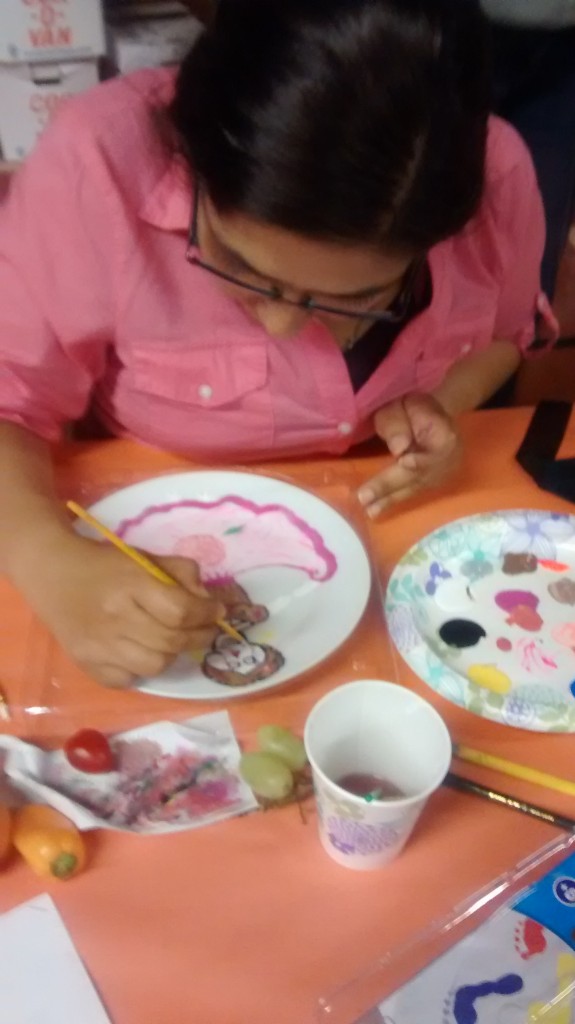
Yessenia Serratos works on a plate at a recent art workshop.
“I gain fellowship with people and I can understand them better as individuals. We speak the same language and come from the same country, but we are very different people,” says Serratos, who is from Baja California, a part of Mexico that does not widely celebrate Dia de los Muertos. Serratos grew up with Halloween instead, so she has taught herself pretty much everything she knows about Dia de los Muertos traditions. She has even drawn inspiration from the artwork of Frida Kahlo, which deals with mortality-related themes.
“I feel nervous about it – it’s my first time. I’ve been watching YouTube videos about everything… including how you make the altar. I want this to be excellent,” she enthuses.
Serratos isn’t sure whether she’ll paint her face this year with sugar skull makeup. “I’ll be the cowgirl rocking the skull shirt,” she jokes.
The Madres aren’t the only group with special plans for the October 29 farmers’ market. A group of students from Pescadero High School will be there, handing out educational materials that explore a very important topic: binge drinking, a common form of alcohol abuse among young people. They will be wearing matching skull-themed t-shirts designed by local artist and Puente program assistant, Jovany Rios.
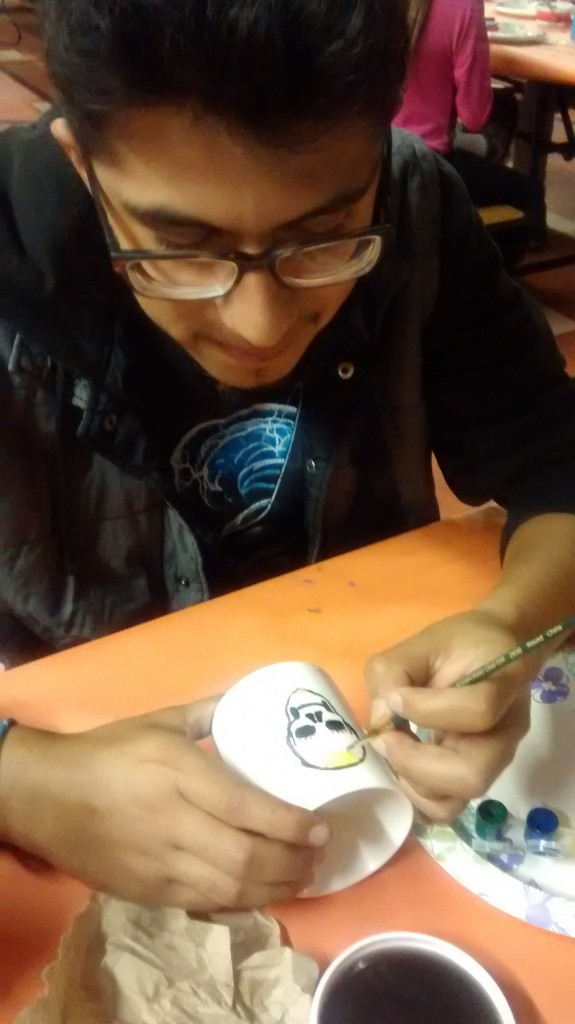
Jovany Rios works on a mug at one of the art workshops.
The students are in a Puente-led discussion group that meets regularly throughout the year to plan education campaigns about alcohol and other drugs. Their goal is to cultivate community-wide awareness through projects that are student-driven, not adult-driven.
“There’s some tragedy in the community around binge drinking, so it will be great to see how their efforts pan out,” says Suzanne Hughes, one of Puente’s marriage and family therapists. Hughes put the curriculum together. The program is supported by a grant from the Youth Leadership Institute.
The young people can earn community service hours for their participation, but there’s an additional perk. Through Friday Night Live, a project of the Youth Leadership Institute, they get to travel to other parts of San Mateo County and socialize with students in the same program.
“It was a small group, but it got popular very quickly once they realized they would get to visit other chapters and meet other youth their age,” says Watkins.
Puente’s behavioral health programs have always had a wide focus by design, from personal and family therapy to group workshops on domestic violence and child abuse prevention, or drug and alcohol abuse.
This fall, a new Puente program called Seeking Safety focuses on the troubling reality of generational trauma among young people in and around Pescadero. Many young people suffer from trauma symptoms without realizing it, says Watkins – from brushes with domestic violence, incest and rape to a family history of substance abuse. And the trauma tends to perpetuate itself in the younger generation.
“It’s not just here, but I do feel we have a higher rate of generational trauma. It’s a rural community, and I think people gravitate toward a place where they can stay isolated. They don’t have to be out in public as much. If you’re traumatized, you try to avoid things that trigger you,” explains Watkins.
The Seeking Safety training, made possible by a grant from San Mateo County, entails 25 skill-building workshops to teach women how to identify the symptoms of trauma and cope with them in a group setting. If participants complete all 25 sessions, they will receive a $1,000 stipend. This year, Puente is working with women aged 18 to 25; next year Puente hopes to work with a similar male cohort.
“They don’t have the language for what’s happening, but when one of them says it, the others recognize it” adds Watkins. “They have no idea where those feelings are coming from.”
Grief is another thing that almost everyone in Pescadero struggles to recognize and process. For her part, Serratos has discovered a meaningful and cathartic way to honor all the loved ones she has lost and misses the most. At Dia de los Muertos, she’s looking forward to the music, the colors, the flowers and the incense.
“I like using my imagination. I’m able to think of the people I’ve lost. And I think about how one day I’m going to go, and how I would like to be celebrated in the same way,” she says.
The Day of the Dead celebration occurs from 3 to 7p.m. on Thursday, October 29 at the final farmer’s market of the season. Enjoy live music, a labyrinth, pan de muerto, and more next to the Pescadero Country Store, 251 Stage Rd.


